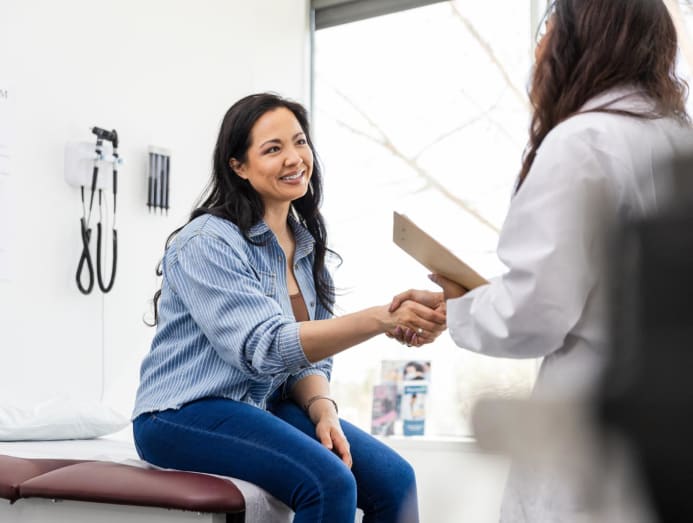Polycystic ovary syndrome: Irregular periods, infertility, excessive hair growth - here’s what you should know
Polycystic ovary syndrome, or PCOS, is a gynaecological health issue that affects about eight to 13 per cent of women. While it doesn’t have a cure, one of the key ways to manage it is through diet and exercise.

One common symptom of polycystic ovary syndrome, or PCOS, is irregular periods. (Photo: iStock/Jacob Wackerhausen)

This audio is generated by an AI tool.
When Nur (who only wanted to use her first name) started menstruating at 10 years old, she didn’t realise that irregular periods were not normal. She would bleed, sometimes for 15 days, sometimes 22 days, and even, 25 days. There would also be two- or three-month stretches where she wouldn’t have a period at all.
The irregularity appeared strange to her – her peers menstruated monthly and for around a week only – but she dismissed her worries.
Then, when she was 21, she experienced her longest interval without a period: Eight months.
“Eight months was so long … and I felt like my body was so tired,” the 27-year-old educator told CNA Women. “I knew I had to get myself checked.”
She visited a gynaecologist and within a week, learnt that she had polycystic ovary syndrome, also known as PCOS.
Nur, who had never heard of the gynaecological condition before, was shocked.
“It was a lot to take in at 21,” Nur said. “I wish I had known more about the condition and how common it was so I wouldn’t be so afraid.”
PCOS: WHAT IT IS AND WHAT CAUSES IT

According to the World Health Organization (WHO), an estimated eight to 13 per cent of women of reproductive age are affected by PCOS.
PCOS is a hormonal condition that affects a woman’s period and fertility, as well as aspects of her appearance, said Dr Anupriya Agarwal, an obstetrician and gynaecologist at Mount Elizabeth Hospital.
The “polycystic” in PCOS comes from the many small cysts (fluid-filled sacs) that develop in the ovaries, Dr Agarwal said.
Dr Veronique Viardot-Foucault, director and senior consultant of clinical endocrinology at the department of reproductive medicine at KK Women’s and Children’s Hospital (KKH), said PCOS is “multi-factorial and complex” with an unclear exact cause. It often runs in families, suggesting a genetic component.
PCOS is also often linked to lifestyle factors such as lack of exercise and overeating, Dr Viardot-Foucault said.
She explained that PCOS makes it more difficult for the body to use the hormone insulin, which converts sugars and starches from food into energy. Known as insulin resistance, this can lead to higher insulin levels in the body as glucose builds up in the bloodstream.
High insulin levels can lead to an increase in male hormones called androgens, Dr Agarwal added, which causes a hormonal imbalance in the woman’s body.
PCOS: SIGNS, SYMPTOMS AND RISKS

Dr Agarwal said PCOS usually begins in adolescence but can start at any time during a woman’s reproductive years.
Common symptoms of PCOS point to the effects of hormonal imbalance and insulin resistance, such as:
- Irregular menses
- Difficulty in conceiving
- Excessive hair growth
- Hair loss or thinning of scalp hair
- Oily skin and/or acne
- Excessive weight gain
- Mood disorders
While Nur said she had almost all of these symptoms, some women with PCOS may not experience obvious symptoms.
To diagnose PCOS, a gynaecologist will take a detailed medical history and conduct a physical examination, do blood tests, or an ultrasound of the pelvis, said Dr Viardot-Foucault.
She added that a woman will be diagnosed with PCOS if she has at least two of three findings:
- Irregular, infrequent menstrual periods or no periods at all
- Increase in facial or body hair and/or blood tests that indicate high testosterone levels
- An ultrasound scan showing multiple small cysts in at least one ovary, or a blood test showing high levels of a marker called anti-mullerian hormone (AMH), which indicates a higher number of eggs in reserve; having too much AMH can stop ovulation from happening
Dr Viardot-Foucault said women with PCOS tend to have an increased risk of developing certain medical issues later in life, such as diabetes, high blood pressure, uterine cancer, snoring and daytime fatigue, severe mood changes, and disorders such as depression.
Both Dr Agarwal and Dr Viardot-Foucault highly encourage women who exhibit PCOS symptoms to get an earlier diagnosis as it can help with their long-term health and prevent complications.
MANAGEMENT AND TREATMENT OF PCOS

There is no cure for PCOS but the disease can be managed. Dr Viardot-Foucault said the aim is to reduce symptoms, address fertility challenges, and prevent or treat related long-term complications.
She noted that good control of symptoms can be achieved through lifestyle changes and, if necessary, medical treatment.
Diet and exercise are key as they can reduce the harmful effects of symptoms.
A good diet includes high-fibre vegetables like broccoli, lean protein like fish, and anti-inflammatory foods like turmeric and tomatoes.
When it comes to exercise, WHO suggests 150 minutes of moderate to vigorous physical activity each week, ideally spread across several sessions.
“PCOS made me feel more conscious about my health,” Nur said. “I exercise a lot, I take care of what I eat, and I feel more loving towards my body – despite the challenges.”
Dr Viardot-Foucault noted that studies have shown that losing five to 10 per cent of body weight can restore ovulation, regulate the menstrual cycle, improve the chances of pregnancy, and lower the long-term risks of diabetes and cardiovascular diseases.
In addition to lifestyle changes, medical treatment can help address irregular periods, fertility problems, excess hair growth, and weight issues.
These include oral contraceptive pills containing progesterone to keep the uterine lining healthy for regular periods, insulin-sensitising medicine to lower glucose levels, and ovulation-inducing drugs such as gonadotropin for those trying to get pregnant.
Women with PCOS can also explore treatments for excess hair growth, or counselling to help manage their mood swings and depression.
LIVING WITH PCOS

Nur is getting married soon and told CNA Women that having PCOS pushed her to confront the potential struggles of starting a family with her partner.
“After I was diagnosed, I started to really reflect on the idea of having children,” she said. “It may be a struggle, but I’m grateful to have a supportive and understanding partner.”
I wish I had known more about the condition and how common it was so I wouldn’t be so afraid.
“My mum and some of my other female relatives struggled with conceiving and irregular periods too – even if they don’t openly talk about it and I’m not sure if they were formally diagnosed with PCOS.
“I hope people know that having a gynaecological condition isn’t the end – a lot of women live with it,” Nur added. “With more information, women can make the best decisions to manage their health in the best way they can.”
CNA Women is a section on CNA Lifestyle that seeks to inform, empower and inspire the modern woman. If you have women-related news, issues and ideas to share with us, email CNAWomen [at] mediacorp.com.sg (CNAWomen[at]mediacorp[dot]com[dot]sg).






